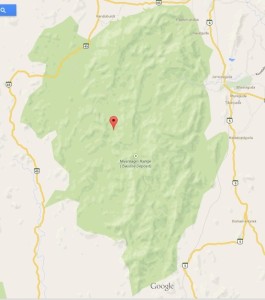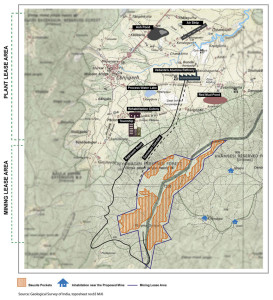India’s current obsession with economic development based on extractive mining projects is spelling doom for its indigenous communities. Their rights to land, livelihoods and self-expression, guaranteed by the constitution, are often violated to get such projects going. Ahead of the International day for Indigenous People, we bring you voices of the people of Niyamgiri, one of many communities in India fighting to safeguard their homes and rights.
[caption id="attachment_10966" align="alignright" width="265"] Niyamgiri Hill (Bauxite Deposit)[/caption]
Niyamgiri Hill (Bauxite Deposit)[/caption]
At this time last year 12 villages of the Dongria Kondh community in Odisha were on their way to make a historic decision. Over a period of one month, residents of these villages had attended Gram Sabhas (village council meetings), which would decide whether or not the UK-based company, Vedanta, could take over Niyamgiri Mountain and mine it for Bauxite to fuel the alumna refinery at Lanjigarh.
Amidst the presence of armed forces threatening the community, the decision was a unanimous one in each of the 12 council hearings held— the community would not leave the mountains and did not want Vedanta around.
“It is not only we, but the entire life systems of the world depend on these mountains. Don’t bring catastrophe to the living world by your mining activity” said one resident during the meeting.
The Dongria Kondh are fighting to save not just their hills, which they believe is the home of their god Niryamraja, but they are fighting to save a way of life. A way of life, which is spun around nature’s delicate web. In each of the village meetings person after person repeated:
“We will give our blood, but will not leave Niyamgiri. It is our god, our home and gives us everything we need.”
These village hearings have been hailed as a decisive moment in India’s democratic history. The people of a land were given the ability to exercise their right to voice their opinion. In an otherwise dark period for the rights of indigenous communities in India, it left behind a sense of hope that all is not lost and that someday our nation will function as a democracy, not just in name.
[caption id="attachment_10967" align="alignleft" width="273"] Map of the proposed mining site at Niyamgiri[/caption]
Map of the proposed mining site at Niyamgiri[/caption]
Fast-forward to August 2014 and it seems like the clock has turned back; it seems like those vociferous declarations made no impression on the Government of Odisha or on Vedanta. In the past few months Vedanta has put forward plans to expand the capacity of the refinery at Lanjigarh. The need to expand the refinery is questionable since without the needed Bauxite it has been operating on half its capacity. The earlier verdict denying access to Niyamgiri means they wont be getting the Bauxite anytime in the near future.
On 30th July the Odisha State Pollution Control Board held a Gram Sabha to seek consent for this expansion. The refinery’s activities affect close to 5,000 people from 12 villages surrounding it. This includes people form Manjhi Kondh, Dalit and other marginalised groups who depend on the hills of the area.
What appeared to be a staged meeting was eventually stormed by some 250-300 Jharania and Dongira Kondh adivasis. A journalist from Odisha, Sudhir Pattnaik shared:
“The so called Public Hearing for Vedanta's illegal alumina plant's expansion proposal in spite of being stage managed ended without any conclusive resolution as the officials and paid participants who were faking there as affected villagers left the venue abruptly when Dongarias and other affected inhabitants started raising their voice against the illegal and unethical expansion proposal. Vedanta officials/ goons with total support of local police and armed police prevented entry of every potential protester/camera man from entering the highly fortified and barricaded Hearing zone… There was no voting, no reading out of resolution, no declaration (when) the Hearing ended.”
The events that have unfolded in the lush hills under the watchful eye of Niyamraja exemplify what indigenous communities face across the world in the face of development projects. Projects like Vedanta promise the moon in terms of monetary gains, economic development but those who have lived on the land want to carry on their lives as they have known it. Sure, they want schools, healthcare facilities and avenues to earn livelihoods but these do not necessarily fall within western-accepted definitions of development. So what is the purpose of enforcing a one-size-fits-all model of economics on such communities? Can we not respect and cherish their vibrant ways of living as one with the earth?
“We don’t want money. Money will not help our children develop in fact it will be the death of our people”
- Lada Sikakka, resident of Serkapadi
Fighting for Change: The Story of Bihar-Based Journalist Amir Abbas
Inspiration can come from many sources, but one of the most powerful is seeing someone walk the path before you. Our Community Correspondent, Syed Amir Abbas found his inspiration in Stalin K., the founding director of Video Volunteers. “I met Stalin at VV’s national meet in 2017 and I...
The torch bearer of rights for marginalized tribals of Odisha
If you ask Video Volunteers’ Community Correspondent Bideshini Patel to rate her childhood on a scale of 1-10, she would probably give it a negative marking due to the neglect and abuse she faced. But if you ask her to evaluate her professional life as an impactful journalist, resolving basic...

